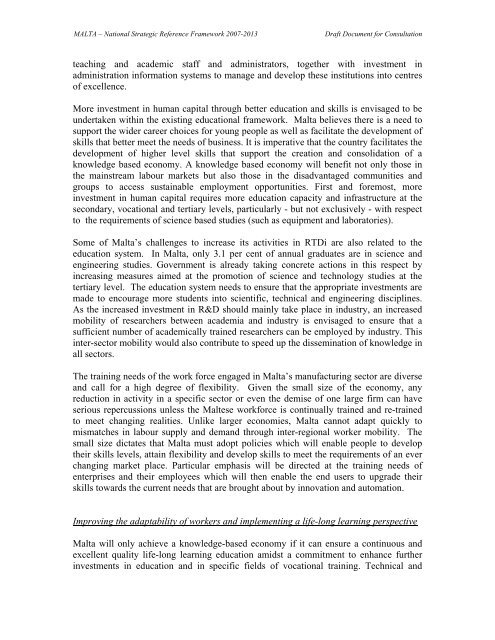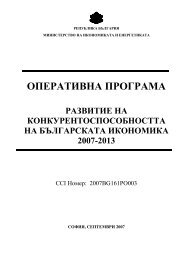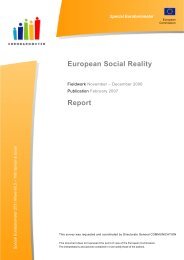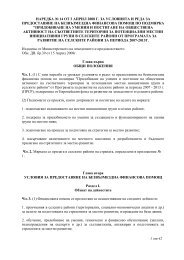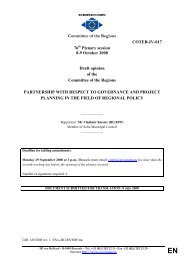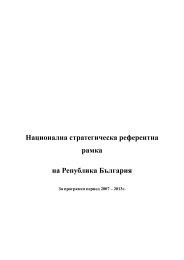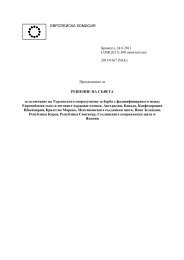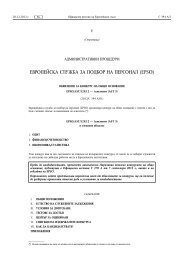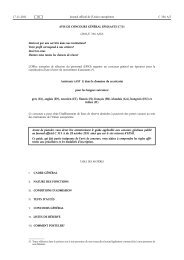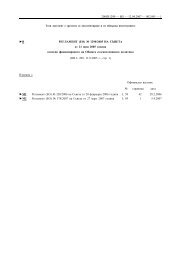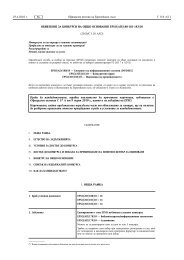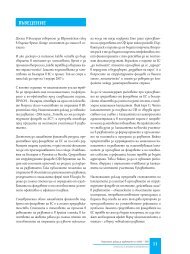National Strategic Reference Framework
National Strategic Reference Framework
National Strategic Reference Framework
Create successful ePaper yourself
Turn your PDF publications into a flip-book with our unique Google optimized e-Paper software.
MALTA – <strong>National</strong> <strong>Strategic</strong> <strong>Reference</strong> <strong>Framework</strong> 2007-2013 Draft Document for Consultation<br />
teaching and academic staff and administrators, together with investment in<br />
administration information systems to manage and develop these institutions into centres<br />
of excellence.<br />
More investment in human capital through better education and skills is envisaged to be<br />
undertaken within the existing educational framework. Malta believes there is a need to<br />
support the wider career choices for young people as well as facilitate the development of<br />
skills that better meet the needs of business. It is imperative that the country facilitates the<br />
development of higher level skills that support the creation and consolidation of a<br />
knowledge based economy. A knowledge based economy will benefit not only those in<br />
the mainstream labour markets but also those in the disadvantaged communities and<br />
groups to access sustainable employment opportunities. First and foremost, more<br />
investment in human capital requires more education capacity and infrastructure at the<br />
secondary, vocational and tertiary levels, particularly - but not exclusively - with respect<br />
to the requirements of science based studies (such as equipment and laboratories).<br />
Some of Malta’s challenges to increase its activities in RTDi are also related to the<br />
education system. In Malta, only 3.1 per cent of annual graduates are in science and<br />
engineering studies. Government is already taking concrete actions in this respect by<br />
increasing measures aimed at the promotion of science and technology studies at the<br />
tertiary level. The education system needs to ensure that the appropriate investments are<br />
made to encourage more students into scientific, technical and engineering disciplines.<br />
As the increased investment in R&D should mainly take place in industry, an increased<br />
mobility of researchers between academia and industry is envisaged to ensure that a<br />
sufficient number of academically trained researchers can be employed by industry. This<br />
inter-sector mobility would also contribute to speed up the dissemination of knowledge in<br />
all sectors.<br />
The training needs of the work force engaged in Malta’s manufacturing sector are diverse<br />
and call for a high degree of flexibility. Given the small size of the economy, any<br />
reduction in activity in a specific sector or even the demise of one large firm can have<br />
serious repercussions unless the Maltese workforce is continually trained and re-trained<br />
to meet changing realities. Unlike larger economies, Malta cannot adapt quickly to<br />
mismatches in labour supply and demand through inter-regional worker mobility. The<br />
small size dictates that Malta must adopt policies which will enable people to develop<br />
their skills levels, attain flexibility and develop skills to meet the requirements of an ever<br />
changing market place. Particular emphasis will be directed at the training needs of<br />
enterprises and their employees which will then enable the end users to upgrade their<br />
skills towards the current needs that are brought about by innovation and automation.<br />
Improving the adaptability of workers and implementing a life-long learning perspective<br />
Malta will only achieve a knowledge-based economy if it can ensure a continuous and<br />
excellent quality life-long learning education amidst a commitment to enhance further<br />
investments in education and in specific fields of vocational training. Technical and


